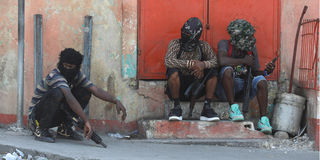Premium
Kenya's Haiti mission in limbo as urgency grows

President William Ruto and Haitian Prime Minister Ariel Henry at State House, Nairobi on March 1, 2024.
What you need to know:
- The United States and other powers are pushing for a swift deployment of Kenyan officers.
- Former Prime Minister Ariel Henry has been unable to return to Haiti because of escalating violence.
Kenya has said its police officers will soon be in Haiti to confront rampaging gangs controlling the capital, but worsening insecurity and uncertainty about financing are casting doubt on the mission's prospects.
Kenya's government, which first pledged to lead an international security mission last July, says the coast is now clear to deploy after it signed an agreement with Haiti's government on March 1 meant to address concerns raised by a domestic judge who deemed the existing plan unlawful.
The United States and other powers are pushing for a swift deployment of Kenyan officers, seen as a prerequisite to allowing a half-dozen other African and Caribbean countries to also send security forces.

Former police officer Jimmy "Barbecue" Cherizier, and leader of an alliance of armed groups, speaks to a news outlet on a mobile phone during a news conference, in Port-au-Prince, Haiti, March 11, 2024.
Former Prime Minister Ariel Henry has been unable to return to Haiti because of escalating violence since he signed the deal in Kenya. He announced overnight he would resign once a transition council and temporary replacement have been appointed.
Kenya's army has previously been sent to countries including Somalia, but its police officers have never been deployed in such large numbers and, for Nairobi, thorny issues remain to be worked out.
"The deteriorating security situation is likely to force a rethink in Nairobi," said Murithi Mutiga, the program director for Africa at the International Crisis Group think-tank.
"The state seems to be crumbling from within and the security situation is much worse than when Kenya offered to lead the mission."
Kenya's presidency and government did not respond to requests for comment.
One major challenge, according to diplomats with knowledge of the matter, is financing. The United States is providing the bulk of the funds for the mission, which was authorised by the UN Security Council in October.
The United States has pledged $300 million. However, a UN spokesperson said that as of Monday, less than $11 million had been deposited into the UN's dedicated trust fund.

US Secretary of State Antony Blinken meets with Jamaican Prime Minister Andrew Holness at the Pegasus Hotel in Kingston, Jamaica, March 11, 2024.
A senior US State Department official said President Joe Biden's administration was working with Congress to get the money transferred.
Kenya has asked to be paid the costs of the deployment upfront, but UN rules require that funds it administers be used only to reimburse costs already incurred, according to a diplomat based in Nairobi and UN officials.
Kenya would therefore need to find a country willing to pay it directly, said the diplomat and UN officials who requested anonymity because of the sensitivity of the discussions.
A senior US official said $100 million in Defense Department funding to the mission announced on Monday would be used for logistics and equipment, and would not pass through the UN trust fund.
It was not clear whether that money could cover some or all of the Kenyan government's requests. Kenya has pledged 1,000 officers to a mission that experts expect to have up to 5,000 personnel.
Addressing reporters on Monday, Interior Minister Kithure Kindiki said Kenya was in the pre-deployment stage.
"There was a small court matter and that has been resolved," he said.
A High Court judge ruled in January that the government's plan was unlawful because there was no "reciprocal agreement" with the host country.
Although the government believes the March 1 agreement addressed the judge's misgivings, the opposition politician who spearheaded the lawsuit has vowed to launch a new challenge.
He argues that the unelected Henry did not have the legal authority to enter into such an arrangement.
Meanwhile, the surging violence over the past week in Port-au-Prince, where gangs besieged the international airport and released thousands of prisoners, has deepened concerns in Kenya about the wisdom of the mission.
Opposition politicians, already critical of the mission as too dangerous and not in Kenya's national interests, have stepped up their criticism.
Opiyo Wandayi, the minority leader in the National Assembly, warned last week of immense losses. Makau Mutua, a prominent law professor, said Kenyan officers would be "sitting ducks".
Enock Alumasi Makanga, a former police officer and the national chairman of the Protective and Safety Association of Kenya, told Reuters that Kenyan police lacked the training and equipment to carry out such a mission.

Gang members sit together after former police officer Jimmy "Barbecue" Cherizier, and leader of an alliance of armed groups, addressed the media, in Port-au-Prince, Haiti, March 11, 2024.
"The level of criminality in Haiti is beyond what our guys can do," he told Reuters.
Kenyan officials have said that the highly-trained paramilitary officers were well-prepared for the challenges.
President William Ruto has said the mission is a "bigger calling to humanity" motivated by solidarity with a brother nation. Haiti requested an international force in October 2022, but foreign governments were reluctant to participate.





